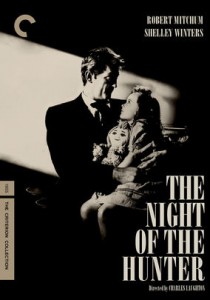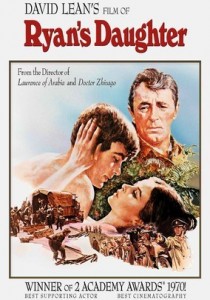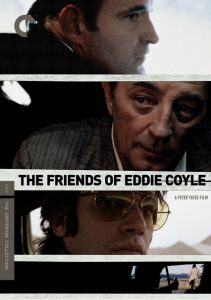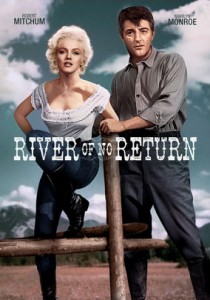The Night of the Hunter-1955
Director Charles Laughton
Starring Robert Mitchum, Shelley Winters
Top 250 Films #61
Scott’s Review #351
Reviewed January 9, 2016
Grade: A
The Night of the Hunter (1955) is a fairy tale for adults. Although it is categorized as a thriller, it certainly teeters on the edge of being a horror film. In addition to being well-written, it also contains breathtaking cinematography.
Made in the mid-1950s, it is shot in black and white and tells the tale of good versus evil in a small town. The film is a masterpiece and one of my all-time favorites.
The film is both creepy and intelligent, and director Charles Laughton is responsible for its considerable success. Although it was not a success upon release, it has only finally received its due admiration as the years pass.
The film is way ahead of its time.
It is based on the 1953 novel by Davis Grubb.
The time is the 1930s, and the setting is rural West Virginia along the Ohio River. Ben Harper, a local family man, robs a bank and hides the stolen money inside his daughter’s doll.
His son and daughter (John and Pearl) are central characters in the story. Caught, Ben is out of the picture, leaving his wife, Wilma (Winters), vulnerable and alone.
A serial killer, Reverend Harry Powell (Mitchum), a misogynist, is on the loose disguised as a preacher. In prison with Ben, he knows the money is hidden and is determined to find out where it is. He has designs on wooing Wilma.
When dire events occur, John and Pearl are left along the river to seek refuge with a kindly older woman, Rachel Cooper (Lillian Gish).
The film is majestic, haunting, and artistic. Each scene seemingly glows as the dark black-and-white colors mix gorgeously with tranquility despite the dark tone of the subject matter.
The Night of the Hunter also has a dream-like visual quality. In one pivotal scene, we see a dead body submerged at the bottom of the river. The scene is horrific, with bulging eyes and bloating beginning to set in, but it is also creatively beautiful.
The flowing hair of the victim and the posture are mesmerizing scenes that stick with you for some time.
Poetic and a sense of good versus evil, this is clearly laid out as Powell has two words imprinted on the knuckles of each hand: “L-O-V-E” and “H-A-T-E.” These words form the basis of the film, as both can be applied to the characters.
My favorite scene is when John and Pearl travel along the Ohio River, fleeing from their rival. The shapes of the trees mirrored by the flowing river are incredible, and I can watch this scene again.
A thriller, written intelligently well, with creativity for miles, is a recipe for pure delight. Director Laughton directed only this one film, encouraging creative collaboration and participation from his actors, which is evident in the resulting masterpiece.
The Night of the Hunter (1955) has had a profound influence on numerous directors.



